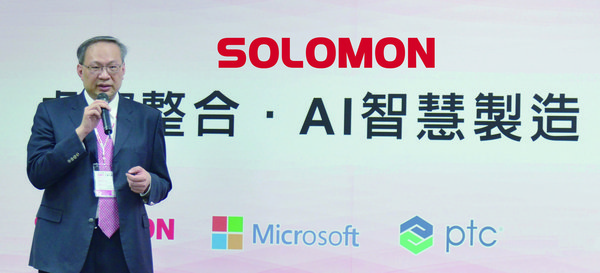TOKYO, Aug. 31, 2018 /PRNewswire/ -- Manufacturers around the world are gearing up to adopt Industry 4.0 in which computers and automation will come together in an entirely new way. Robotics connected remotely to computer systems equipped with machine learning algorithms, such as Solomon's suite of AI-based machine vision solutions, can enhance productivity by enhancing the monitoring of advanced manufacture processes.

Take random bin picking for example. The seemingly simple task is not quite as easy for robots. Yet, Solomon's AccuPick 3D system is able to perform bin picking with high recognition rate and ease of use thanks to its 3D scanner capable of generating high quality point cloud at high speed. The system is capable of recognizing complex shapes objects with maximum efficiency and precision.
AccuPick's motion planning module is specifically targeted for applications requiring robot arms to maneuver inside of an outsized bin in industries ranging from automotive components, electronics, food packaging, machine tending, and warehouse de-palletization. The system is able to work in complex environment while remaining compatible with major robot brands, such as Universal Robots(UR+ certified), Fanuc, Staubli, Yaskawa, Kuka, ABB and more.
Advanced tasks such as sealing, assembly, welding or inspection can also be equally difficult or time consuming for robots. Solomon's 3D vision guided robot solution, Solmotion, takes complexity out of these seemingly challenging tasks as it recognizes unique features to determine the three-dimensional position and orientation of a workpiece with precision and speed.
All it takes is for the Solscan 3D scanner to take a snapshot of the workpiece, before the software immediately matches and calculates the required routes for robot to move along. Applications include sealing of automotive parts, gluing of footwear parts, quality inspection of metal or plastic injection objects, welding of motors, to name a few.
In industrial setting, defects and features with irregular patterns such as hard-to-define scratches, stains, cracks and many other types of flaws, Solvision, Solomon's AI-based machine vision software, can further solve inspection problems. The software deep learning requires no tedious writing of codes to inspect various types of defects.
All it takes is a few samples to label the defect types for machines to learn, simplifying inspections tasks and saving significant amount of engineers' time to write the programs. Another advantage of Solvision is its seamless integration with different robots, six-axis or SCARA, Solomon's 3D Solscan scanner and software, so inspected objects can be automatically separated accordingly.
If you would like to find out more about the Solomon's suite of AI-based machine vision solutions, the company will display its latest innovations at the Booth No. 21-43 of the 1st RoboDEX Nagoya that unfolds from Sept. 5 to 7 at the Portmesse Nagoya, Japan.
Media contact:
Mr. Yang
Tel No. 886-2-87918989
Website https://www.solomon-3D.com
EMAIL inquiry@solomon-3D.com